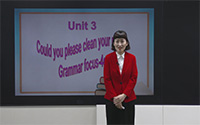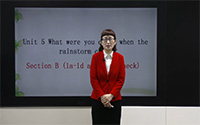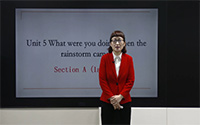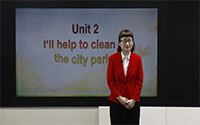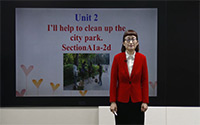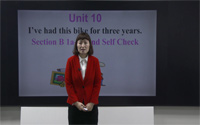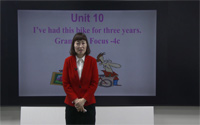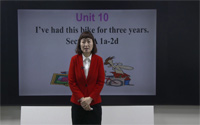课程内容
《Could you pelease clean your room?》(Section A Grammar Focus-4c)
Revision
根据所学内容,写出下列短语。
叠衣服 fold one's clothes
做菜 do the dishes
用某人的电脑 use one's computer
扔垃圾 take out the rubbish
铺床 make the bed
扫地 sweep the floor
熬夜 stay out late
生某人的气 be angry with sb.
带......出去散步 take sb.for a walk
打扫客厅 clean the living room
在......上工作 work on
过来 come over
做家务 do the housework
搭车 get a ride
阅读下列句子,观察问句的用法及回答。
Grammar Focus
Could I go out dinner with my friends?
Sure,that should be OK.
Could we get something to drink after the movie?
No,you can't,you have a basketball game tomorrow.
Can you please take the dog for a walk?
OK,but I want to watch onr show first.
Can you please take out the rubbish?
Yes,sure.
重难点点评
—peter,could you please take out the trash?
—Sure,Mom.
—Could you please do the dishes?
—Sorry,I can't.I have to do my homework.
在表示请求帮助或请求允许的疑问句中,常用could代替can,以表示礼貌,委婉或不确定的语气,而can则不具备这些语气。这种情况下不能把could看作can的过去式。以上两句中用could是为了表示礼貌的请求。表示请求帮助或请求允许时,除了can,could之外,还可以用may,句子的表达方式也各有不同,可以用不同的方式来表示同一个概念。例:
(1)Could/Can/May I use yur car for a day?
(2)I wonder if I could use your car for a day?对于(1)(2)句所作允答可以各种各样,如同意可以说Yes或Sure或Certainly,还可说Yes,(do)Please.或Of course.(you may/can).或Goahead,Please.或That’s OK/all right;如果不同意,可以说I'm really sorry,but I have to use it today.要避免说No,you can't.这样显得很不礼貌。否定回答通常用委婉语气。
(3)Do you mind if I use your car for a day?对于句(3)所作回答可以说Never mind./Not at all.表“不介意”。不能用Yes或Sure或Certainly等.无论肯定还是否定应答中,要避免使用could,要用can或may。因为应答须用确定的语气。而could在表请求的问句中是为了表示礼貌或委婉语气,用在应答中则成了不确定语气,与情理不符。所以应答中不说Yes,you could.或No,you couldn't.而要说Yes,you can.或Sorry./No,you can't.
—could I Please use your compter?
—Sorry,I'm going to work on it now.
—Well,could Iwatch TV?
—Yes,you can.
could I/you Please...?表示一种有礼貌的请求或提议,其后连接原形动词,比Can you/I...?语气更委婉。类似句型有:
Would you like+sth./to do sth.?
May I+do sth.?
Shall we+do sth.?
Would you mind+sth./doing sth.?
What/How about+sth./doing sth.?
肯定回答有Sure./Of course./Certainly./OK./Great./Well./Good idea./I agree.等。否定回答有Sorry.../No,you can't等。
情态动词用法小结
1.情态动词不能表示正在发生或已经发生的事情,只表示期待或估计某事的发生。
2.情态动词除ought和have外,后面只能接不带to的不定式。
3.情态动词没有人称,数的变化,即情态动词第三人称单数不加-s。
4.情态动词没有非谓语形式,即没有不定式、分词等形式。
could与can的区别
could与can都是情态动词,could是can的过去式。二者都可用于表示请求,但是用法稍有不同。
can 表示一般性的请求,语气随便,常用于熟人之间或长辈对晚辈,上级对下级的场合。
e.g.Can you tell us your story,Tony?Tony,你能给我讲讲你的故事吗?
could表示有礼貌的请求,语气委婉,常用于非熟人之间或晚辈对长辈,下级对上级的场合。
e.g.Could you tell us if it snows in winter in Australia?
sure.请告诉我们。澳大利亚冬天下雪吗?
当然可以。
注意:1.提出委婉的请求在回答中不可用could。
A:Could I have the televidion on?
B:Yes,you can./No,you can't.
2.在否定,疑问语句中表示推测或怀疑用couldn't
He couldn'tbe a bad man.他不太可能是坏人。
may和might
表示允许或请求;表示没有把握的推测;may放在句首,表示祝愿。
May God bless you!
He might be at home.
注意:might表示推测时,不表示时态,只是可能性比may小。
have to 和must
1.两词收拾“必须”的意思,have to表示客观的需要,must表示说话人主观上的看法,既主观上的必要。
My brother was very ill,so I had to call the doctor in the middle of the night.
我弟弟病得很厉害,我只得半夜里把医生请来。(客观上需要做这件事)
He said that they must work hard.
他说他们必须努力工作。(主观上要做这件事)
2.have to有人称、数、时态的变化,而must只有一种形式。但must可用于间接引语中表示过去的必要或义务。
He had to look after his sister yesterday.
3.在否定结构中:don't have to表示“不必”,mustn't表示“禁止”。
You don't have to tell him about it.你不一定要把此事告诉他。
You mustn't tell him about it.你一定不要把这件事告诉他。
Practice
Make up dialogues using the sentences in Grammar Focus with your partner.
A:Could you please take the dog for a walk?
B:OK,but I want to watch one show first.
4a write R for requests and P forpermission.Then match each one with the correct response.
a. Yes,here you are.
b.Hmm.How much do you need?
c.Yes,sure.No problem.I finished reading it alst night.
d.Yes,but don't come back too late.
e.No,I can't.I cut my finger and I'mtrying not to get it wet.
1._P_Could I hang out with my friends after the movies? d
2._R_Could you please pass me the salt? a
3._P_Could I borrow that book? c
4._R_Could you help me do the dishes? e
5._R_Could you lend me some money? b
borrow 和lend
boeeow和lend都有“借”的意思,但它们的含义和用法有所不同。
borrow表示“借入”,即吧本来不属于自己的东西借来暂时使用,常与介词from连用。
如:You can borrow a book from the library.
lend 表示“借出”,即吧属于自己的东西借给别人暂时使用,常与介词to连用,也可以跟双宾语。
如:He's going to lend his bike to Tom.
You mustn't lend others my pen.
4b Fill in the blanks in the conversation.
A:I hate to( do)chores.
B:Well,I hate some chores too,but I like other chores.
A:Really?Great!(Could)I ask you to (help)me with some chores then?
B:what do you need help with?
A:(Could)you please (fold) myclothers for me?
B:I don't want to do that!It's boring!
A:OK.Then (could) you (please) do the dishes for me?
B:Sure,no problem.But (could) we go to the movies after that?
A:Sure.I'll finish my homework while you help me with the dishes.Then we can go to the movies.
hate用作动词,与like意义相反,以为“憎恨,厌恶,不喜欢”,其后可接名词、代词、动词的-ing形式以及动词不定式等。
e.g.Lily hated exercsing when he was young.
I hate to do the laundry now.
Groupwork
4c Make a list of things your group needs to do for a camping trip.Then discuss who wil doo them andcomplete the chart.
To-do list Name
bring a tent Liu Chang
What should we do before the trip?
take a big cloth buy some drinks
bring a tent buy some food
take an unbrella bring a camera
take a rubbish bag prepare some progreams
A:Could you please bring a tent,Liu Chang?
B:Sure.And could you please...?
C:Sorry,I can't.I have to...
Homework
Write a letter to your friend to ask him/herto take care of youe house when you are on vocation.
此内容正在抓紧时间编辑中,请耐心等待
史老师
女,中教中级职称
在教育教学过程中,潜心研究教学理论,不断探索创新,积累了丰富的教学经验,逐步形成了新颖独特的教学方法。



